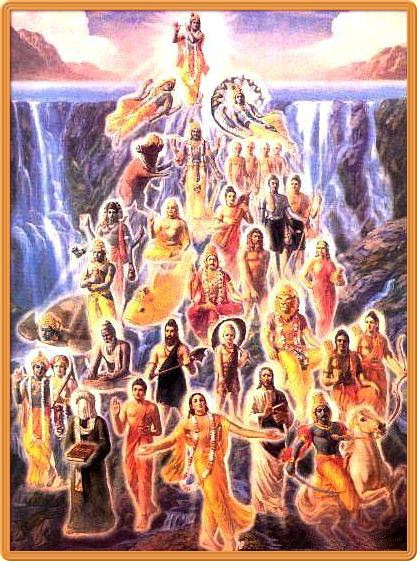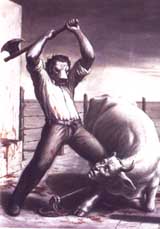

![]() What
the major religions say regarding Vegetarianism
What
the major religions say regarding Vegetarianism
![]() More
Religious Vegetarian links (Buddhist, Christian, Jain, Jewish, Hindu,
Islamic, Sikh etc)
More
Religious Vegetarian links (Buddhist, Christian, Jain, Jewish, Hindu,
Islamic, Sikh etc)
![]() You
mean is says that in the Bible......... referring to Vegetarianism:
You
mean is says that in the Bible......... referring to Vegetarianism:
![]() Quotes
from Visionary Nikola Tesla on Vegetarianism:
Quotes
from Visionary Nikola Tesla on Vegetarianism:
.
Judaism
- Christianity - Mormans - Islam - Laws of Karma
![]()
Becoming
Pure Through the Vegetarian Life-style:
Article from Perfect
Questions Perfect Answers

A page explaining the reasons why devotees of Lord Sri
Krishna avoid certain things in the daily practices of our Krishna conscious
life-style. By so doing, free from the bondage of these four items or acts
enables devotees to be situated in spiritual consciousness. Read what these
four pillars in society are, understand their implications, learn about
how to discriminate what is binding and what frees one from karma (action
and reaction) There are many nice stories, analogies, and facts here, and
some helpful links too.
Chapter 6 Dhyana-yoga TEXT 16
naty-asnatas tu yogo 'sti
na caikantam anasnatah
na cati-svapna-silasya
jagrato naiva carjuna
WORD FOR WORD
na--never; ati--too much; asnatah--of one
who eats; tu--but; yogah--linking with the Supreme; asti--there is; na--nor;
ca--also; ekantam--overly; anasnatah--abstaining from eating; na--nor;
ca--also; ati--too much; svapna-silasya--of one who sleeps; jagratah--or
one who keeps night watch too much; na--not; eva--ever; ca--and; arjuna--O
Arjuna.
TRANSLATION
There is no possibility of one's becoming
a yogi, O Arjuna, if one eats too much or eats too little, sleeps too much
or does not sleep enough.
PURPORT
Regulation of diet and sleep is recommended
herein for the yogis. Too much eating means eating more than is required
to keep the body and soul together. There is no need for men to eat animals,
because there is an ample supply of grains, vegetables, fruits and milk.
Such simple foodstuff is considered to be
in the mode of goodness according to the Bhagavad-gita. Animal food is
for those in the mode of ignorance. Therefore, those who indulge in animal
food, drinking, smoking and eating food which is not first offered to Krsna
will suffer sinful reactions because of eating only polluted things. Bhunjate
te tv agham papa ye pacanty atma-karanat. Anyone who eats for sense pleasure,
or cooks for himself, not offering his food to Krsna, eats only sin. One
who eats sin and eats more than is allotted to him cannot execute perfect
yoga. It is best that one eat only the remnants of foodstuff offered to
Krsna. A person in Krsna consciousness does not eat anything which is not
first offered to Krsna. Therefore, only the Krsna conscious person can
attain perfection in yoga practice. Nor can one who artificially abstains
from eating, manufacturing his own personal process of fasting, practice
yoga. The Krsna conscious person observes fasting as it is recommended
in the scriptures. He does not fast or eat more than is required, and he
is thus competent to perform yoga practice. One who eats more than required
will dream very much while sleeping, and he must consequently sleep more
than is required. One should not sleep more than six hours daily. One who
sleeps more than six hours out of twenty-four is certainly influenced by
the mode of ignorance. A person in the mode of ignorance is lazy
and prone to sleep a great deal. Such a person cannot perform yoga.
His Divine Grace A.C. Bhaktivedanta Swami Prabhupada
Bhagavad Gita As It
Is On-line
Bhagavad
Gita on Food Types:

CHAPTER 17:7
ähäras tv api sarvasya
tri-vidho bhavati priyaù
yajïas tapas tathä
dänaà
teñäà bhedam
imaà çåëu
.
TRANSLATION
"Even the food each person prefers
is of three kinds, according to the three modes of material nature. The
same is true of sacrifices, austerities and charity. Now hear of the distinctions
between them."
PURPORT
In terms of different situations
in the modes of material nature, there are differences in the manner of
eating and performing sacrifices, austerities and charities. They are not
all conducted on the same level. Those who can understand analytically
what kind of performances are in what modes of material nature are actually
wise; those who consider all kinds of sacrifice or food or charity to be
the same cannot discriminate, and they are foolish. There are missionary
workers who advocate that one can do whatever he likes and attain perfection.
But these foolish guides are not acting according to the direction of the
scripture. They are manufacturing ways and misleading the people in general.
.
Bhagavad Gita 17:8.
.
äyuù-sattva-balärogya-
sukha-préti-vivardhanäù
rasyäù snigdhäù
sthirä hådyä
ähäräù
sättvika-priyäù
.
TRANSLATION
"Foods dear to those in the mode
of goodness increase the duration of life, purify one’s existence and give
strength, health, happiness and satisfaction. Such foods are juicy, fatty,
wholesome, and pleasing to the heart."
.
Bhagavad Gita 17:9.
.
kaöv-amla-lavaëäty-uñëa-
tékñëa-rükña-vidähinaù
ähärä räjasasyeñöä
duùkha-çokämaya-pradäù
.
TRANSLATION
"Foods that are too bitter, too
sour, salty, hot, pungent, dry and burning are dear to those in the mode
of passion. Such foods cause distress, misery and disease."
.
Bhagavad Gita 17:10.
.
yäta-yämaà gata-rasaà
püti paryuñitaà
ca yat
ucchiñöam api cämedhyaà
bhojanaà tämasa-priyam
.
TRANSLATION
"Food prepared more than three
hours before being eaten, food that is tasteless, decomposed and putrid,
and food consisting of remnants and untouchable things is dear to those
in the mode of darkness."
PURPORT


Ashvamedha and Purushamedha are not sacrifices in the sense of killings
of Ashva and Purusha, as wrongly translated by the first generations of
indologists (who were missionaries), but is a ritual in which Ashva ad
Purusha play the central role in establishing or knowing/understanding
how the balance of power respectively the division in society is. Would
the Rajasuya then mean the pressing=killing of the Raja?
Medha is a word which has
a cognate in Medha=Wisdom or Medhira, which means the same. (Medha comes
from older obsolete mazdha, which is attested in Avestan (Ahura) Mazda,
the Varuna of the ancient Iranis. No Varuna is associated with killing
of animals.
The only time people are sacrificed is in the Antyeshti Yajna, or cremation ceremony.
Besides this, the understanding that the potency of the brahmanas was
very much different in previous times, they were much stronger and more
pure. The brahmanas would recite Vedic mantras and lead an animal to the
sacrificial fire, however the animal wasn't just thrown into the fire and
its body then eaten as the Christian missionaries presented "animal sacrifice
of the pagan savages" to be. Rather prior to the Kali yuga an old animal
was lead to the fire, and by the perfect recitation of sacred Vedic mantras
when the animal was lead into the fire it's old body was rejuvenated by
the flames rather than consumed and a young healthy body inherited.
Due to the lack of potency
of the brahmanas in the Kali yuga, it is condemned that one even try to
perform such a sacrifice in this age. There were several advocates of Ahimsa
in this regard; Lord Buddha and His doctrine of Ahimsa, the saint Madhwacharya
(circa 13th centuary) who stopped animal sacrifice again in India and had
Vedic brahmanas offer grain balis into the fire with the mantra idam krsnaya
idan na mama, Chaitanya mahaprabhu is mentioned in the Pratisagar parva
19th Chapter of Kaliyuga khanda of Bhavishya purana as being the instigator
for this.
Gomedha doesn't mean the killing of Go=cow, but it means agriculture. It is known in old Iran-Afghanistan as Gomez, which is only used in the sense of agriculture. Both cultures are cognate, so are their customs. Go-medha then is the proper sacrifice of the animals strength in using it in agriculture within the daivi varnashram system, that dedicates all of men's natural attributes and actions, as well as that of those animals in their care into the blissful service of Govinda (pleaser of the cows and the senses) - Gopala (He who looks after the cows).

Hindu scriptures on eating meat/killing animals
http://www.hindunet.com/forum/showflat.php?Cat=&Number=20798&page=0&view=collapsed&sb=5&o=&fpart=1
The Hinduscriptures from the oldest Vedic to all the later layers in
time all advocate vegetarianism and not killing animals and certainly never
offer animals in their Yajnas!
The Vedic word frequantly mentioned is Aghnya = not to be killed. This
word was in particular used for cows.
Aahavaniiye maamsapratishedha (Katyayana Sutra)
That which is used in Yajna (aahavaniiya) must be vegetarian
Maa himsyaat sarvabhuutaani. (RigVeda)
No creature/animal should be killed.
Yah paurusheyena kravishaa samankte yo ashvyena pashunaa yaatudhaanah,
Yo aghyaayaa bharati kshiiramagne teshaam shirshaani harasaapi vrshcha.
(RV 10.87.16)
The evil person who kills or eats the meat of a horse or cow deserves
to be terminated.
Dhaanaa dhenurabhavad, vatso’syaastilo’bhavat. (AtharvaVeda 18.4.32)
Rice is named as ‘cow’ and sesame as ‘calf’.
[Just like someone saying ‘I want the meat of hazel = I want the nut
of hazel]
Maamsapaakapratishedhashcha tadvat. (MiimaamsaSuutra 10.3.65)
Killing and eating meat is totally prohibited.
Dhenuvachcha ashvadakshinaa. (MS 10.3.65)
Like a cow is given (in charity) so also a horse.
Suraam matsyaan madhu maamsamaasavam krsaraudanam,
Dhuurttaih pravartitam hyetannaitad vedeshu kalpitam. (Mahabharata,
ShaantiParvan 265.9)
It is only the evil-minded hypocrites who started telling that Vedic
Yajnas involve intoxicants and meat eating. It is not in the Vedas.
[This comment must have been around the time, far beyond the Bharata
Battle and in post-Vedic times, when many customs arrived in the Vedic
Heartland, which were totally foreign to its culture]
The full AnushaasanaParvan of the Mahaabhaaratam discusses the evils of meat eating:
Akhaadannanumodamshcha bhaavadoshena maanavah,
Yo’numodati hanyantam so’pi doshena lipyate. (MB, AnushaasanaParvan
115.39)
The one who himself doesn’t eat meat but even if he gives his consent
to eat meat or to kill an animal, he becomes equally sinful as them.
Ijyaayajnashrutikrtairyaa maargairabudho’dhamah,
Hanyaajjantuun maamsagrdhnuh sa vai narakabhaangnarah. (MB, AP 115.43)
The meateater who kills an animal in the name of Vedic Yajna or tells
that it is a requirement of the Yajna is a sinner and he will be a person
who will dwell in hell.
Aahartaa chaanumantaa cha vishastaa krayavikrayii,
Samskartaa chopabhoktaa cha khaadakaah sarva eva te. (MB, AP 115.45)
The one who brings an animal to be killed, the one who buys an animal
to be killed, the one who sells, buys, cooks and eats the meat are all
sinners.
Na dadyaadaamisham shraaddhe na chaadyaad dharmatattvavit,
Munyannaih, syaatparaa priitiryathaa na pashuhimsayaa. (Bhaagavatam
7.15.7)
It is Dharma that in the Shraaddha feast he should never offer meat
nor should eat meat. Only vegetarian food must be offered because meat
is obtained by killing.
[One can understand that in the days of this particular verse, the
mainstream Hindus were confronted with people starting to eat meat]
Naitaadrshah paro dharmo nrnaam saddharmaamichchhataam,
Nyaaso dandasya bhuuteshu manovaakkaayajasya yah. (Bhaagavatam 7.15.8)
This is the best Dharma to observe for everyone that one should not
hurt other beings even in his thoughts.
ManuSmriti or ManavaDharmaShastra
Manu strongly admonishes that one should never drink and should never even smell any intoxicant like wine. (MS. 11.146-149)
Manu asserts that selling, buying, cooking and eating meat is a sin which is as great as killing an animal itself. (MS 5.15)
Gaudii Paishtii cha Maadhvii cha Vijneyaa trividhaa suraa.
Yathaivaika tathaa sarvaa na paatavyaa dvijottamaih. (MS 11.94)
Yaksharakshah pishaachaannam madyam maamsam suraasavam.
Tad braahmena naattavyam devaanaamashnataa havih. (MS 11.95)
Brahmans, Kshatriyas and Vaishyas should never drink wine, liquor or
intoxicants of any kinds, because intoxicants, wine, liquor and meat of
animals are the food of Yakshas, Rakshasas and Pishachas (all kind of non-Vedic
people or even demons). So they mustn’t consumed.
Naakrtvaa praaninaam himsaam maamsamutpadyate kvachit.
Na cha praanivadhah svargyastamaanmaamsam vivarjayet. (MS 5.48)
Anumantaa vishasitaa nihantaa krayavikrayii.
Samskartaa chopahartaa cha khaadakashchetighaatakaah (MS 5.51)
Flesh of animals is obtained only after killing him, which is a sin,
and the killer of animals never enters the celestial abode.
All those involved in killing, consenting the killing, helping the
killing, carrying, selling, buying, cooking and eating the meat of an animal
are equally sinful as the killing of that animal.
Incorrect view of Hindus (Shraaddha ritual)
Annam tu saadhikshiiram goghrtam sharkaraanvitam. (Maasam) priinaati
vai sarvaanpitrnityaaha keshavah. (Matsya Purana 17.30)
Vegetarian food prepared with pure butter, milk, sugar and curd, etc.
are most pleasing to the
Pitr.
Dvau maasau matsyamaamsaena triinmaasaanhaarine tu.
Aurashnenaatha chaturah shaakunenaatha pancha vai. (MP 17.31)
Shanmaasam chhaagamaamsena trnyanti pitarastathaa.
Sapta paarshatamaamsena tathaashtavenajena tu. (MP 17.32)
Dasa maasaamstu trnyanti varaahamahishamishaih.
Shashakuurmajamaamsena maasaanekaadeshaiva. (MP 17.33)
Samvatsaram tu gavyena payasaa paayasena cha.
Rauravena cha trpyanti maasaanpanchadashaiya tu. (MP 17.34)
Vaardhranisasya maamsena trptirdvaadashavarshikii.
Kaalashaakena chaanantaa khadgamaamsena chaiva hi. (MP 17.35)
Verses 31 to 35 describe the acts of cooking and offering of all kinds of meat (fish, gazelle, sheep, special birds, goat, deer, black deer, pig, buffalo, rabbit, turtle, special deer, rhino) to Pitr, which is totally out of place and out of context, and it appears to have been deliberately interpolated. The 36th verse again goes like this:
Yatkimchinmadhusammishram gokshiiram ghrtapaayasam,
Dattamakshayamityaahuh pitarah puurvadevataah. (MP 17.36)
Apart from the cow’s milk, honey and the sweet pudding made of milk
and rice and sugar with dry nuts satifies Pitr forever.
Interpolation in Aashvalayana GrhyaSutra 5 (Shraaddha)
In the end of this chapter there are 45 sutras on Shuulagava which is
a ceremony to sacrifice a bull/ox for Shiva to appease him.
Everybody familiar with Shiva and Nandinii, knows that that is impossible.
If Ashvalayana was a gotra of Vasishtha, as stated in the Sutras, then
that is equally impossible, because Vasishtha owned Nandinii, and was famous
for his protection of cows. And he was a Shaiva.
Note
It is very significant that most of the interpolated verses on eating
of animal flesh is in relation to the Shraaddha ritual. The rest are in
other Samskara ceremonies.
The Harivamsha an appendix to the Mahabharata describes in the Giri
Utsava Varnana the sacrifice of bulls and buffaloes in the Govardhana worships.
One familiar with the Krshna worship does understand the ridiculous statement.
In the Paraskara GrhyaSutra one comes across the description of a 6
month old baby who has to be fed with meat in the Annapraashana Samskara
ceremony. How disgustful and obviously a horrid interpolation.
Source:
Swami Prakshananda: The True History and Religion of India
2001, Delhi. Motilal Banarsidass.
(additional remarks, changes and new order done by me)
Edited by Ishwa (09/20/02 04:15 PM)
The Vedic literature says like this, that God has no leg, no hand. Therefore the impersonalists take advantage of it. "Oh, here it is stated God has no legs, no hands." But the next line is, javana grhita: "He can accept everything which you offer Him in devotion."
Now how He can accept? If He has no hand, how He can accept things from us? That means He hasn't got a hand like us. His hand is different. Therefore even though He is situated in the spiritual world, which is far, far away from us, still, He says in the Bhagavad-gita, it is said,
patram puspam phalam toyam
yo me bhaktya prayacchati
tad aham bhakty-upahrtam
asnami prayatatmanah
Krsna says that "A little flower or little water or a little leaf, whatever My devotee offers Me in love and devotion, I accept it." And tad aham bhakty-upahrtam. "And because he has brought it with great devotion, therefore I eat." Tad aham bhakty-upahrtam asnami. Asnami means "I eat." Now you can say, "All right, I'll offer these fruits and flower to God, but it is the same. It is remaining. How He is eating?" But His eating is not like my eating, because He hasn't got a body like this. This body is material. If you bring me a plate of fruits, this body immediately swallows it. But He has got spiritual body. He eats... Simply as soon as He knows that you have offered it in devotion, He eats immediately.
Go here to follow the simple system for offering
foodstuffs to the Lord
... and always
with the Magic ingredient - Offer it to Krishna.....
... with L'n D (love and devotion)
http://www.hknet.org.nz/How2offer.htm
Why do we offer our food to God before eating?
http://www.bhojan.org/dynamic/modules.php?name=Content&pa=showpage&pid=11
Why do we offer our food to God before eating?
http://www.bhojan.org/dynamic/modules.php?name=Content&pa=showpage&pid=11
Jewish Vegetarians - our diet as Kiddush Hashem
http://www.jewishveg.com/
Islamic Vegetarian site:
http://www.islamicconcerns.com/
Concessions made for meat eating in Islam
http://www.islamicconcerns.com/fatwas.asp
"You Mean That's in the Bible" - expose on
meat eating:
http://www.textfiles.com/occult/CHRISTIAN/ymtitb.txt
Christian Vegetarian links:
http://www.jesusveg.com/links.html
Blessed are the merciful - Christian Vegetarians
http://www.jesusveg.com/index2.html
St Francis of Assisi - Bless All Animals
http://www.goveg.com/feat/stfrancis.html